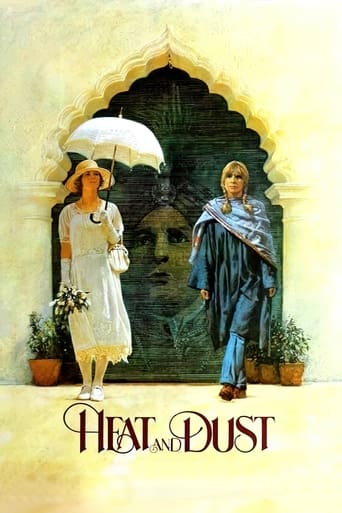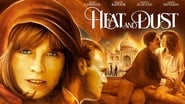intinvestor
It's a story told in two different time periods of two different woman who are attached by decision taken by both of them in there lives. Both the era generated by director with there details are mesmerizing, but modern day India dulls against the British one as there are many clichés that are shown which exist till today among western countries about India. Period films are mastered by merchant ivory production and this one of the finest examples of it. We are captured by the brilliant photography and then by the characters etched by screenwriter and director. Greta schahi proves her mettle in her first major role and Julie Christie is just as natural as always. Casting of every little character is perfect. Best thing is the way story is told, how two era become one and how easily is one moving from one to other.modern day story dulls little bit against raj era one but it is saved by Julie Christie's beautiful presence. Certain question arise and they are answered beautifully. How we get in a relationship with someone who is so different from us culturally and in every way, is it just the avaibality or something more ? Human mind is such an intriguing place to understand. Why we take certain steps always remains a question. Just like the character of chid. Who is running away from world yet is attached to it.
pefrss
I just discovered this movie, which I must have missed when it was originally released. I am a big fan of Greta Scacchi since I saw her in "White Mischief" and I just lately admired Julie Christie in "Away from her". In the eighties, I went myself on an exploration trip through India and have been fascinated with this country forever. I was really looking forward to see the movie.I was a little bit amused to see Greta Scacchi again cast in the role of the adulterous wife in colonial times. In White Mischief, she decides first against poor Hughes Grant and marries a much older wealthy man, only to fall later for a dashing tall British officer in Kenya. In "Heat and Dust", she, playing Olivia is happily married to the dashing tall British officer but cannot resist a pompous wealthy Indian prince. I wonder if casting directors think that beauties like Greta have to be the toys of rich men? While Greta is constantly naked in "White Mischief" there is only one half nude scene in "Heat and Dust" and she is not yet quite as stunning as she is in "White Mischief". However, her character dominates above the character of Julie Christie and not only because of her beauty. The movie's charm is supposed to be the juxtaposition of the India in the 1920s versus the India in the 1980s. Julie Christie, as Ann explores the life of her great-ant, Olivia, who scandalously left her husband for the Indian nawab, but ended up living alone in the Himalayas... Both women fall for Indian men and both get pregnant. Olivia decides to abort the child, as she is not sure if it is her husbands or the nawab's child. The movie is filmed at the same locations. In the colonial times everything looks splendid and well maintained, in the eighties things have deteriorated . But all in all it gives an interesting insight in Indian life.Maybe the more exotic and luxurious costumes and decorations in the 1920segments make this part of the movie more memorable. The affairs in-between the British women and the Indian men are only sketchily shown, but it is made clear that they were as unacceptable in the 20s as they were in the 80s by both sides. The Indian society is governed by even more rules than the British one. This was Greta Scacchi first major film out of drama school , but she leaves a much stronger impression than Julie Christie, who took this role over a better paying offer for another film. Definitely, a very beautiful and entertaining film and worth while to have in a DVD collection.
James Hitchcock
During the 1980s the British entertainment industry was going through a period of fascination with all things Indian, especially with the Raj. This was the decade of Richard Attenborough's "Gandhi", David Lean's "A Passage to India" and the television version of "The Jewel in the Crown" and this one is another in the same vein. There are two intertwined stories. The first is set in the 1920s and deals with an illicit affair between Olivia, the beautiful young wife of a British colonial official and an Indian Nawab. The second, set in the seventies or eighties, deals with Anne, Olivia's great-niece, who travels to India hoping to find out about her great-aunt's life, and while there also has an affair with an Indian man.A similar device was used in another British film of this period, "The French Lieutenant's Woman", which also switched backwards and forwards between a story set in the past and one set in the present day. There is, however, a difference between the two films in that in "The French Lieutenant's Woman" the present-day story was an invention of the scriptwriters and was not found in John Fowles's original novel; it was inserted to provide a cinematic equivalent to Fowles's strong authorial voice and his famous two alternative endings. In "Heat and Dust" the modern scenes were an integral part of Ruth Prawer Jhabvala's book on which the film was based. Her aim seems to have been to compare contemporary attitudes to race and sex with those prevailing in the days of the Raj.The trick of cross-cutting between two different stories with only a tangential connection between them can be a difficult one to bring off, in literature as well as in the cinema. Neither "The French Lieutenant's Woman" nor "Heat and Dust" works particularly well in this regard. In both cases the story set in the past is the stronger one, partly because it is filmed in a more sumptuous and visually memorable style, and partly because it is more fundamentally serious. We can empathise with Olivia because of the potentially tragic consequences of the course of action she is pursuing; the romance of Anne and Inder Lal seems trivial by comparison. (Inder Lal is cheating on his wife Ritu, but this fact tends to get overlooked).The makers of "The French Lieutenant's Woman" (in my view the better of the two films) appear to have recognised this problem, because they devote much more attention to the Victorian romance of Charles and Sarah than they do to the contemporary one of Mike and Anna. They were also able to provide a semblance of unity to the film by using the same actors, Jeremy Irons and Meryl Streep, to play both sets of lovers. In "Heat and Dust", however, the cross-cutting can be confusing as we constantly move from one story to another. The parallels between the values of the seventies and those of the twenties, which were well brought out in Jhabvala's novel, tend to get lost here, even though she wrote the screenplay herself.The other main weakness of "Heat and Dust" is that we never really understand why Olivia becomes entangled with the Nawab. This is no tale of an Anna Karenina or an Emma Bovary, married to a dull older man who neglects her and whom she does not love. Olivia's husband Douglas is young, good-looking and attentive; at the start of the film, indeed, she seems desperately in love with him, preferring to stay with him during the summer heat rather than follow the other memsahibs to the cool of the hill station where they spend the summer away from their husbands. Shashi Kapoor's oily Nawab, by contrast, is an obvious scoundrel, despite the dubious glamour conferred by his royal status. (The British suspect him of being in league with a gang of bandits, allowing them to operate with impunity in exchange for a share of their booty).With this reservation, however, the story of Olivia is generally well done. The lovely Greta Scacchi, in her first major role, makes an appealing tragic heroine. (She was to play another adulterous colonial wife a few years later in "White Mischief"). The other parts are generally well played, and there is an amusing cameo from Nickolas Grace as Harry, the Nawab's effeminate but sinister British adviser. The look of this part of the film is attractive, made in Merchant Ivory's normal "heritage cinema" style. Interestingly enough for a film made by an Indian-born producer and an American-born director, its politics seem less concerned with post-colonial guilt than do those of many British productions about the Empire. Although some of the British are obviously racist, such as Patrick Godfrey's doctor, the administrators we see often seem more concerned for the welfare of the Indian population than do their own rulers such as the Nawab.The modern story, however, seems like an intrusion into the much more interesting historical one. Julie Christie is normally a gifted actress, but she seems wasted here. There is some fitful humour provided by the character of Chid, the American convert to Hindu mysticism who seems more interested in cheap sex than he does in enlightenment. Otherwise this part of the film can arouse little interest. 6/10
sol-
As per usual, James Ivory captures a good feel for the period and setting, helped by, as usual, a fitting Richard Robbins score. As a cultural study, it has some things to say, with an insight into the culture of the indigenous Indian population, but it conveys little in the way of messages, as the screenplay is awfully convoluted, not helped by switching between different narrators and time periods. Some of the supporting characters are not defined well either, and there are a few lethargic gaps between events in the tale. The filming on-location is great, and generally it is all rather well made, but it pales against the work that Merchant-Ivory would produce later on, as this simply is not near a perfect film.





